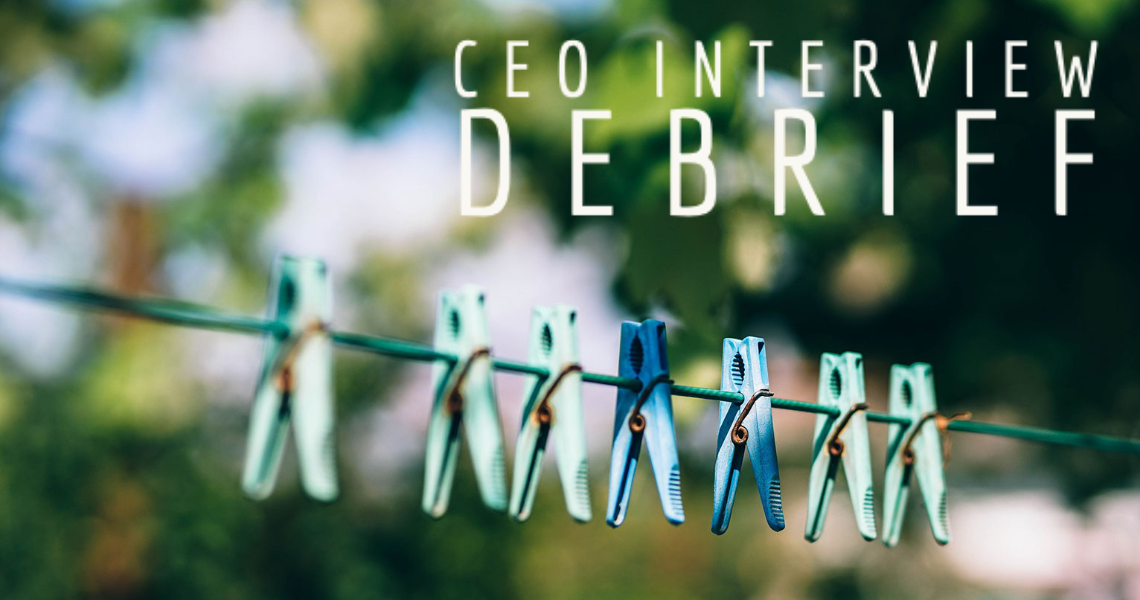One of the hardest parts of being an in-house PR lead can be guiding the CEO through a media interview and then answering the question at the end: “How’d I do?”
Most CEOs just want you to say “great.” Because whether they want to admit it or not, interviews are stressful and can be high-stakes. So the CEO doesn’t want to hear that they didn’t do well. They generally don’t want to make time for a debrief just to hear you pick out the errors in what they said, or remind them that they missed a key message. And let’s be honest – it’s incredibly tempting to just say “You were great.” Because we’re all people pleasers, because we want the CEO to keep doing interviews, because it can be really hard to tell them that they sucked.
So I’m starting a little series to help you. Just like I do in executive media training, I’m going to take some CEO interviews and give you a synopsis of what I think went well, and what did not go so well. (I will likely stick to BNN interviews because they are longer and meatier.) Perhaps it will help you give feedback to your own CEO, or perhaps the CEOs themselves will identify with some of the challenges and tips.
First up is a Sept. 16 BNN interview with Michael Emory, CEO of Allied REIT. (I don’t know Mr. Emory or anyone on his team.) This interview caught my attention because of the headline “Don’t let bank staff ‘hijack’ return to office: Allied REIT CEO.” Ouch.
Emory was on BNN in a command performance after calling out Canadian banks in July for their approaches to return to office, which the Allied REIT CEO deemed inferior to the U.S. bank approach. Because a CEO daring to question the strategy of the bank CEOs is interesting TV, Emory was back in September when TD announced that because of the Delta variant, return to office had been delayed until at least the new year. (Rather than give you the play by play of the interview, you can watch the interview here.)
I imagine that Mr. Emory felt the interview went well and never gave the interview another thought. Many will agree. The host didn’t ask any really difficult questions, and he got almost nine minutes of airtime to make his case for why he believes companies should be bringing their people back to the office. Hint: he says “competitiveness” several times.
What Went Well
- The CEO took control of the interview from the very first question, by more or less ignoring it and setting up the framework for how he thinks about back to office: that he has a duty to protect his employees, customers, the communities in which they operate, and “last but not least” shareholders.
- Emory prepared. He had his sound bites ready. (This sounds obvious but CEOs are often unprepared and have no clue what their key messages are.)
- He’s warm and friendly and an interesting interview. It was good TV, and the host will have him back.
What Went Less Well
- Saying that shareholder interests were “last, but not least” in a pandemic may very well come back to haunt him.
- Emory suggests that the banks are somehow neglecting the interests of their stakeholders as he has set out, talking about shareholders and communities, but never quite comes out and makes his point. Why does he care if the banks bring their workers back to the office?
- His choice of language is verging on offensive when he talks about the importance of “getting back to work.” You can practically hear his own employees screaming “What do you think we’ve been doing for the past 19 months???”
- The interview goes completely off the rails at the 5m30 mark when he says in his outside voice what I suspect he’s been saying to his executive team for weeks as they debate how to bring their own staff back.
“I think it’s important that we not allow the minimally engaged employees in an organization to hijack the agenda. I think we need an agenda that is designed to serve the highly engaged and who want to get back to work in its fullest sense and compete for business. I believe if you don’t get back to work and compete for business, your competitors will, and you will lose out.”
Is he talking about bank employees, as the BNN headline writer concluded? Or is he throwing shade at his own employees, trying to end an internal debate while conflating face time with engagement and performance? The idea that it’s only disengaged or subpar employees that don’t want to return to the office – whether right now during the fourth way or perhaps ever – both ignores the realities of working parents and suggests a talent strategy that will miss out on those who think differently.
At the root of the problems with this interview are two key problems:
- The key messaging was either not crisp or not delivered (or perhaps both). Language like “back to work” rather than “back to the office” makes him sound both out of touch and insulting.
- Other than because he was invited, it’s really not clear why Emory did the interview. Was it to justify to his own employees why they need to come back to work? Was it to tell the bank CEOs that by not bringing workers back to the downtown that communities are hurting? That the decisions of those leaders will have a ripple effect, right through to his own company?
3 Tips to Make it Better Next Time
- Anytime a CEO spends valuable time doing an interview, be clear about what your agenda is; know why you are doing the interview with that outlet at that time and what you want readers or viewers to take away from that interview. If you can’t answer that question, you have work to do before saying yes. If not, you risk an interview in which your employees think you don’t value their work at home and the CEOs of Canada’s biggest companies thinking you think you know better than them.
- Don’t assume that viewers or readers have seen previous interviews. You need to restate your main thesis in every time. In July Emory told the Globe, “I am dumbfounded by the lack of leadership from the chartered banks. They need to find a backbone.” Later that month, he joined BNN after his quarterly results were released and was asked about his comments. He explained that other businesses followed the banks’ lead, and that small businesses that couldn’t work from home were hurting because people had not returned to the downtown core. Without this context, we’re left wondering why he’s talking about the banks at all.
- Acknowledge the elephant in the room. If people’s work habits are changing, that has implications for a downtown real estate company, though Emory was never challenged on this point. Emory could not allow for the obvious shift in how people think about where work gets down. It’s a systemic shift that is affecting his industry, and instead of sharing insights and how Allied is adapting, he appears to have his hands over his eyes and ears simultaneously.


